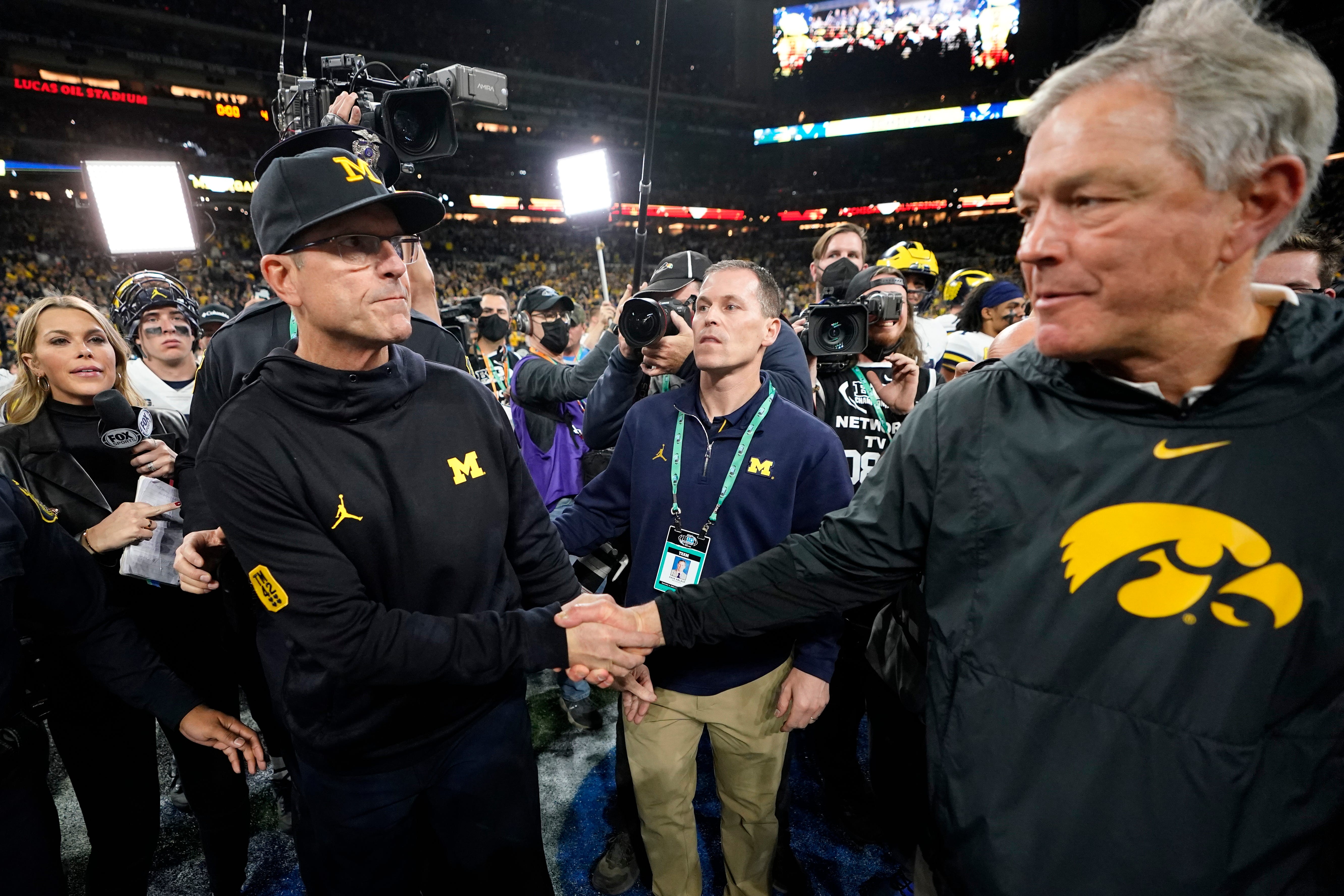Iowa threw everything at Michigan superstar Aidan Hutchinson. It still wasn't enough.
INDIANAPOLIS — It was akin to watching a drill with the blocking sled. Only, instead of pushing a piece of metal around the practice field, Michigan defensive lineman Aidan Hutchinson was thumping Jack Plumb, Iowa's 6-foot-7, 296-pound offensive lineman, early in the second quarter of Saturday's Big Ten Championship game at Lucas Oil Stadium.
With the Hawkeyes facing 3rd-and-8, Hutchinson blasted off the line of scrimmage and barreled into Plumb, driving him back and into quarterback Spencer Petras just as he released the ball. The wobbly pass fell incomplete as a second defensive lineman collided with Hutchinson and Plumb in the backfield.
That’s the sort of night it was for the Hawkeyes. Michigan (more specifically Hutchinson) lived in their backfield, smothering their ground game and largely keeping their passing attack off-balance and out of sync.
Those two factors worked hand-in-hand in Iowa’s demise Saturday night, culminating in a 42-3 loss.
More:Leistikow: Time for Kirk Ferentz to make tough decisions about his offense
"They have a veteran front, a pro-style defense in some ways with big, bulky guys in the middle," Iowa coach Kirk Ferentz said. "They made it really tough to run the football (Saturday). We expected that. But we were hoping to run with success, too."
Hutchinson spearheaded the defensive onslaught.

The first defensive player to win Big Ten Championship Game MVP honors, the 6-foot-6, 265-pound senior was credited with four total tackles, a sack, a tackle for loss and two quarterback hurries, though his contributions are better qualified than quantified.
Iowa had to account for his presence on every snap and did whatever it could to try and neutralize him — double-teams, triple-teams, cut blocks and chip blocks.
None of it was particularly effective.
If anything, the attempts to contain him provided opportunities for the future first-round NFL Draft pick to showcase his strength and elite skill-level. In fact, Hutchinson's sack came against a double team: He bounced off Plumb at the line of scrimmage, then swam around running back Tyler Goodson as he angled towards the quarterback.
"He is a heck of a player, run or pass," Ferentz said.
"There's not a lot you can do (against their pass rush)," he later added. "You try to throw the ball quickly and try to chip with the tight ends or backs, but it's not new to the guys. They've been seeing it all season long."
Hutchinson was the most prominent of Iowa's problems, but he certainly wasn't the only one.
No, that list starts with the run game — or lack thereof.

Michigan was committed to stopping the run and proved capable of doing so, limiting Iowa to just 3.2 yards per carry (Gavin Williams' 11-yard run early in the fourth quarter was its longest of the night).
The rushing woes were particularly prominent in the first half — averaged 1.8 yards on 19 carries — and effectively set the tone for the entire game.
Unable to gain more than 2-3 yards on most first- and second-down plays, the Hawkeyes faced an average third-down distance to gain of 8.4 yards, with five attempts over nine yards in distance.
"It comes down to running the ball," tight end Sam LaPorta said. "If you can run the ball effectively, get those chunk plays of 5-6 yards and stay ahead of the chains, it's really like the jell to the offense. … We needed to be more efficient on third down and to get the run game going early."
When forced into obvious passing situations, be it by down-and-distance or the deficit, Iowa was left to contend with the Wolverines' ferocious pass rush, which generated nine quarterback hurries and effectively limited the Hawkeyes to short passes and screens.
Their most promising drive — a 14-play, 60-yard march midway through the third quarter — was brought crashing down inside the 10-yard line when two short runs were followed by a one-yard completion on third down and a pass under duress from quarterback Alex Padilla to Tyler Goodson that lost seven yards on 4th-and-3.
"They covered it well," Padilla said. "There wasn't a whole lot we could do on that play."
"We executed well on that drive and had a good rhythm going with mixing up the run and the pass to keep them off balance," he later added. "But obviously we weren't able to finish it and that's the most important part."
Just when it looked like Iowa's offense may have a glimmer of hope, Michigan's defense took steps to stamp it out, a microcosm of Saturday's game as a whole.
"You're just trying to give yourself a chance to stay competitive in the game and close the gap at some point, but they make it a real challenge," Ferentz said. "And I alluded to it: They're a good pro defense, they're stout inside and then on passing downs they've got two guys that can rush that passer really well. It affects the game."